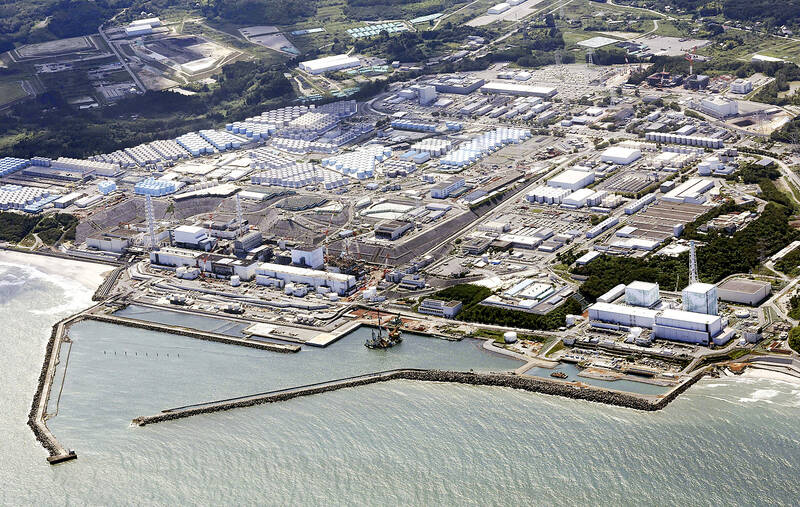A Japanese court overturned a US$92 billion damages verdict yesterday against the former bosses of the operator of Japan’s stricken Fukushima Dai-ichi nuclear power plant, thought to be the largest such award ever in the country for a civil suit.
Four former executives had in 2022 been ordered to collectively pay ¥13.3 trillion in a suit brought by shareholders over the nuclear disaster triggered by a massive tsunami in 2011.
However, the verdict was thrown out yesterday by the Tokyo High Court, a spokeswoman for the institution said.

Photo: AP
Shareholders had argued the catastrophe could have been prevented if Tokyo Electric Power Co (TEPCO) bosses had listened to research and implemented preventative measures like placing an emergency power source on higher ground.
However, the defendants countered that the risks were unpredictable, and the studies cited were not credible.
“The defendants ... cannot be found to have had this foreseeability at a point in time before the earthquake in question,” yesterday’s court ruling said.
The ¥13.3 trillion damages award was believed to be the largest amount ever ordered in a civil suit in Japan.
It was meant to cover TEPCO’s costs for dismantling reactors, compensating affected residents and cleaning up contamination.
In 2015, British oil giant BP was ordered to pay US$20.8 billion for the Gulf of Mexico oil spill in what was described at the time as the highest fine ever imposed on a company in the US.
The court spokeswoman said an appeal by the shareholders for an even higher damages order of ¥22 trillion had been denied.
Hiroyuki Kawai, head of the plaintiffs legal team, issued a stark warning at a news conference yesterday.
“If I were to summarize today’s ruling in one phrase: it is a ruling that will lead to future serious nuclear accidents,” he said.
TEPCO declined to comment on the High Court verdict.
Three of the Fukushima Dai-ichi nuclear plant’s six reactors were operating when a massive undersea earthquake triggered a massive tsunami on March 11, 2011.
They went into meltdown after their cooling systems failed when waves flooded backup generators, leading to the worst nuclear disaster since Chernobyl.
Overall, the tsunami along Japan’s northeast coast left about 18,500 people dead or missing.
In March, Japan’s top court said it had finalized the acquittal of two former TEPCO executives charged with professional negligence over the Fukushima meltdown.
The decision concluded the only criminal trial to arise from the plant’s 2011 accident.

The collapse of the Swiss Birch glacier serves as a chilling warning of the escalating dangers faced by communities worldwide living under the shadow of fragile ice, particularly in Asia, experts said. Footage of the collapse on Wednesday showed a huge cloud of ice and rubble hurtling down the mountainside into the hamlet of Blatten. Swiss Development Cooperation disaster risk reduction adviser Ali Neumann said that while the role of climate change in the case of Blatten “still needs to be investigated,” the wider impacts were clear on the cryosphere — the part of the world covered by frozen water. “Climate change and

Packed crowds in India celebrating their cricket team’s victory ended in a deadly stampede on Wednesday, with 11 mainly young fans crushed to death, the local state’s chief minister said. Joyous cricket fans had come out to celebrate and welcome home their heroes, Royal Challengers Bengaluru, after they beat Punjab Kings in a roller-coaster Indian Premier League (IPL) cricket final on Tuesday night. However, the euphoria of the vast crowds in the southern tech city of Bengaluru ended in disaster, with Indian Prime Minister Narendra calling it “absolutely heartrending.” Karnataka Chief Minister Siddaramaiah said most of the deceased are young, with 11 dead

Poland is set to hold a presidential runoff election today between two candidates offering starkly different visions for the country’s future. The winner would succeed Polish President Andrzej Duda, a conservative who is finishing his second and final term. The outcome would determine whether Poland embraces a nationalist populist trajectory or pivots more fully toward liberal, pro-European policies. An exit poll by Ipsos would be released when polls close today at 9pm local time, with a margin of error of plus or minus 2 percentage points. Final results are expected tomorrow. Whoever wins can be expected to either help or hinder the

DENIAL: Musk said that the ‘New York Times was lying their ass off,’ after it reported he used so much drugs that he developed bladder problems Elon Musk on Saturday denied a report that he used ketamine and other drugs extensively last year on the US presidential campaign trail. The New York Times on Friday reported that the billionaire adviser to US President Donald Trump used so much ketamine, a powerful anesthetic, that he developed bladder problems. The newspaper said the world’s richest person also took ecstasy and mushrooms, and traveled with a pill box last year, adding that it was not known whether Musk also took drugs while heading the so-called US Department of Government Efficiency (DOGE) after Trump took power in January. In a